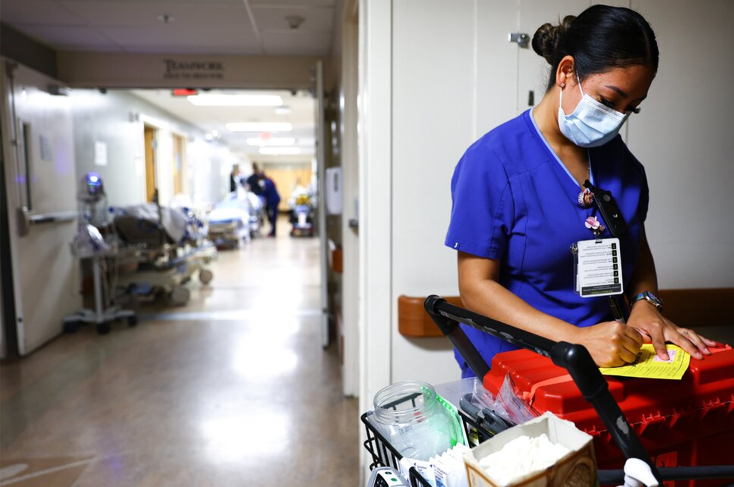An increase in coronavirus cases across Europe due to a highly contagious variant is raising concerns that the U.S. could follow suit as mitigation measures like masking and social distancing have largely fallen by the wayside.
BA.2, a subvariant of omicron sometimes referred to as “stealth omicron,” appeared to fuel recent surges in Germany, the U.K., Austria, France, Switzerland, Italy, Ireland and Greece.
Coronavirus waves in Europe have long proven to predict a surge in the U.S., so experts are keeping a close eye on the development. They see similarities between the U.S. and European countries, including waning immunity from both vaccinations and prior infection as well as the recent relaxation of mitigation strategies. But there are differences, including, notably, that many European countries report higher vaccination rates than the U.S.
For now, many predict an increase in cases in the U.S., but they say it won’t be equivalent to previous peaks. The potential uptick could start as soon as next week, leading infectious disease expert Anthony Fauci said on Tuesday.
“If we are going to see an uptick, we should start seeing it within the next week or so,” Fauci said Tuesday during an online event hosted by The Washington Post, noting that the U.S. typically lags three weeks behind surges in the U.K.
Any increase in cases will surely be a test of the new masking guidance from the Centers for Disease Control and Prevention. Fauci indicated he doesn’t have high hopes for Americans resuming masking if instructed to by health officials.
He said it would be a “tough time” convincing people to go back to mitigation measures. But he encouraged those who are at high-risk for severe COVID-19 to follow CDC recommendations should they change.
“Hopefully, we will not be put into that position,” Fauci said.
Under current CDC guidance, virtually all Americans live in areas where they do not need to wear masks indoors. But when the agency relaxed its guidance, it warned that measures could need to be reimplemented.
For now, cases and deaths are declining in the U.S., and the CDC has some support for its decision to relax mask guidance.
“A mask mandate for the general public is, quite honestly, not needed anymore,” says Ali Mokdad, an epidemiologist with the University of Washington’s Institute for Health Metrics and Evaluation.
BA.2, while roughly 50-60% more transmissible than the original omicron strain, does not appear to cause more severe cases of COVID-19, according to Fauci. It also doesn’t look like it evades protection from vaccines any better than the original strain.
Research suggests that BA.2 can reinfect people shortly after they recover from the original lineage of omicron, though the occurrence is “rare” and is seen “mostly in young unvaccinated individuals with mild disease not resulting in hospitalization or death.”
Given the subvariant’s increased transmissibility, Fauci said it could eventually take over as the dominant variant circulating in the U.S.
Last week, BA.2 was responsible for nearly 35% of new coronavirus infections in the U.S. That’s a jump from 22% of cases the week prior and nearly 16% the week before that, according to the CDC’s estimate. In some regions, including the Northeast, BA.2 is responsible for over half of new infections.
“We aren’t seeing this massive takeoff of omicron, of BA.2, but we do anticipate that we will see more and more of it, and it may become the predominant variant in the weeks ahead,” CDC Director Rochelle Walensky said last week during a panel discussion with the Bipartisan Policy Center.
Experts expect that immunity provided from vaccines and prior infection will soften the blow from BA.2. Mokdad estimates that roughly 75-80% of Americans have some form of immunity against omicron.
“We are in a much better place right now, for a while, until we have a new variant, until we … aren’t immune anymore from COVID-19, especially omicron,” Mokdad says.
Even if BA.2 does cause a small increase in cases in the U.S. in the near future, Mokdad suggests waiting to strategically reimplement mitigation measures later in the year in order to provide protection going into the winter months. Similarly, he suggests holding off on fourth vaccine doses until closer to winter.
However, he adds that he would prefer the shot to be the omicron-specific vaccines that Moderna and Pfizer are developing, if possible. Moderna and Pfizer both submitted applications for a fourth dose to the Food and Drug Administration last week – but for another shot of their original coronavirus vaccine, not the omicron-specific shots, trials for which are underway.
“We need to come back before winter and make sure when we have the new vaccine, we … level with the public” to encourage them to get the shots, Mokdad says.
If those vaccines don’t materialize, another shot of the original coronavirus vaccines should be administered before the winter, he says.
But getting Americans to get a fourth vaccine dose could be a hard sell. Only 65% of Americans are considered fully vaccinated and just half of people who are eligible to get a booster dose have done so, despite ample vaccine supply.
“Very few people have decided to take a third shot in the U.S.,” Mokdad says.
Meanwhile, the CDC and others need to keep a close eye on which variants are circulating in the U.S. so that mitigation measures like masking can be reimplemented if problems – like a new variant – arise, he adds.
“As we are relaxing this mandate, and I am supportive of that, we need to keep an eye and be more vigilant in our surveillance to detect any change as soon as possible and revise our recommendations,” Mokdad says.











